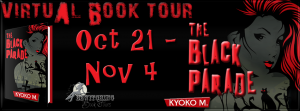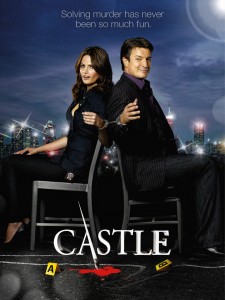Holy crap. It’s November. NaNoWriMo is here. HEAD FOR THE HILLS.
Ha, that was a joke. You’re not going anywhere, writers. I’ve chained you by the ankles and now you have to sit and listen as Grand Master Kyoko tells you about NaNoWriMo and why you should be doing it.
For those who don’t know, NaNoWriMo is short for National Novel Writing Month. It’s a competition in which we write a novel in a month, starting on November 1st and ending on November 30th of every year. What do you win? A cool little button from the official website and eternal bragging rights.
Now, if you’re not a writer, you might be thinking, big deal, it’s just a novel. Uh, no, newbie, let me shut you up right there. It’s not a book. You have to write exactly 50,000 words in thirty days. And no, John Bender, I don’t mean the same word repeated 50,000 times. You’ve read a novel before. That entire story typically takes a writer between four and eight months, depending on what level they’re on. And they are expected to do that within thirty days so you had damn well better respect it before I box you upside the ears.
Back to you, writers. As it says on most of my author profiles, I participated in NaNoWriMo in 2011 and actually completed it. But I’m not trying to brag when I mention it—I’m trying to add some authenticity to this post. That crazy, painful month taught me a lot and I’d like to share it with you to give you encouragement on your first day of writing.
Writing is f@#king hard. Now, granted, you already know this, authors, but trust me, NaNoWriMo is going to enforce it like a bouncer outside of a sexy night club. You’re going to feel like Judge Doom at the end of Who Framed Roger Rabbit—flattened while you flailed and screamed in a high-pitched voice. It’s hard enough to pound out 50,000 words a year for a paycheck (or for nothing if you’re an indie author like me hahaha it hurts to laugh), but cramming all of that process into a month is going to make you want to eat a bullet. But you’re not going to do that. Tuck in your skirt, lady.
Writing is hard because it’s worth it. You’re going to have days when you write the full 2,000 word a day quota, and then you’ll have days when you write two sentences and then eat a bucket of Americone Dream while sobbing that you are a total failure. You’re going to struggle over character motivations and action sequences and witty one liners and it’s going to suck. You’re going to stare at the clock and wonder how you ever thought this was a good idea. You’re going to curse God and try to make a deal with Lucifer in order to inspire you to reach that finish line.
And you know what?
That’s a good thing.
It’s all about pacing yourself. This is also a concept that is infinitely hard for writers because the creative process isn’t like the scientific method. There isn’t a quota or a calculation to writing. There is no formula. It’s all free ideas flowing constantly through your brain and your soul. It comes and goes. But you don’t have time for that hippie stuff when you only have a month to write a full on novel. What NaNoWriMo taught me is to simply let go: let go of the perfect dialogue, the flawless landscape of the plot, the meticulous character details, all of it. NaNoWriMo is all about raw materials. A diamond isn’t beautiful until it’s polished, but it’s still a diamond. No one said you had to pull it fully cut out of the ground—you simply have to dig for it and you’re there. Your draft is going to be total garbage at first, but that’s the entire point. NaNoWriMo is dumpster-diving, plain and simple. You learn to dig through different piles each and every day. You’ll find some yucky stuff and toss it aside, but you’ll also find buried treasures that you never thought you could find.
There are also plenty of resources to help you with pacing yourself each day. To total up to 50,000 words in a month, you basically have to write 2,000 words a day, but that’s rounding up. There is an exact number of words (around 1,600 or so), but I think it’s healthier to aim for 2,000 because then if you fall short one day, you’ll still be ahead by a little bit. That way, if you have a long day at work and you don’t have time to write, you can realistically catch up.
Let go of your inner perfectionist. I feel like such a hypocrite saying this, but it’s definitely a hard lesson that NaNoWriMo taught me. I get my perfectionist habits from my parents—a business consultant who is working on his Ph.D and a registered nurse who works in case management, respectively—and they aren’t easy to kick. I take it ten times more seriously in my writing than in my real life, too. I obsess over every single word and where it is and how it’s phrased and how I can make it so perfect that publishers will bang down my doors and filmmakers will run up to me begging to make my book into a movie so that I can finally achieve my dream of meeting Nathan Fillion and marrying him and oh wait I lost my point back there, didn’t I? Ahem. I fret over my own writing day and night. I think I’m substandard. I weep that I’m not Jim Butcher. I read my favorite novels over and over in vain attempts to soak up their greatness and squeeze it back out over my own manuscript.
But you can’t do that in a month.
A month gives you enough time to map out where you want to go and then you just trail-blaze, like Miguel and Tulio. Don’t stop for all the little stuff. You have words to write. It’s like cutting through vines in a jungle—you’ll get stuck if you stop every five minutes to clean the mud off your boots. You have to let go of all the things that make you want to stop and edit and erase what you’ve written. You can’t do that. You have to accept your faults and move on because this is about the end game. You’re heading for that pyramid with the huge diamond on top. You have a goal and by God, you’re going to reach it and don’t let that crazy person in your head talk you out of it no matter what.
The reward outshines the difficult journey. First of all, don’t you dare get down on yourself if you are unable to finish NaNoWriMo. You are NOT a failure. This is one of the hardest competitions any writer will ever face, so don’t even think for a second that you are less of an author if you don’t complete it in time. I’m not saying this to coddle you, either. The truth is that NaNoWriMo has more than one reward. It’s not just about the bragging rights. Even if you don’t finish on time, there are still great things to gain from it.
First of all, you still have an original idea in manuscript form. That’s fantastic. Once November is over, you’re free to go back to being a regular crazyface author and you can do whatever the bloody hell you want with your new story. You can chop it up into bite sized pieces, you can make it into a series, you can turn it into a screenplay, you can do anything. That’s an incredibly liberating notion, isn’t it? All the rules no longer apply and you can take it wherever you want, including nowhere if you don’t like it (like I did. The Starlight Contingency was a one time gig and I have no plans to finish it, but it’s still great that I did it. But if you’re curious, you can read the entire thing for free right here: The Starlight Contingency.)
Second of all, if you do win, you can always look back on that victory no matter what happens in your future career. No one, and I mean no one, can take away that fresh, exhilarating thrill when you think about the fact that you condensed months’ worth of work into thirty days. Not everyone can write a novel. Sure, some hacks can fart one out and become bestsellers, but they didn’t do it in a month. You did. You’re awesome. You’re a god. You’re Elvis. You’re one bonafide bad mother sucker.
And after you do it, take the time to celebrate. Strut down the street like you’re a sexy piece of ass and don’t let anyone tell you anything different. You did something worthwhile and that very few people could ever do. That’s the real reward of NaNoWriMo. It’s a celebration of the writing process and celebrating the brave souls who do it, whether just for a month or a year or for their entire lives.
And that might sound corny, but I truly think that is why every single writer should try it at least once in their lifetime. Whether you complete it or not, you’re going to learn something for free.
Who doesn’t want that?
Good luck, my darlings. Open that document and get started.
Don’t worry. I got your back.
-Kyoko






